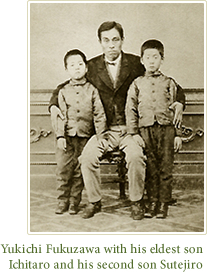- HOME
- School
- Principles
-
Affection for Children and the Strength of the Family
Affection for Children and the Strength of the Family
Affection for Children and the Strength of the Family
Ever since Yukichi Fukuzawa's time, Keio has placed value on education during childhood and education in the home, as the basis for cultivating human beings with independence and self-respect.
"Momotaro was a wicked person who should really be called a thief"
"Momotaro is said to have gone to Onigashima ("Demons' Island") to get the demons' treasure. What an outrageous thing to do! The treasure was precious to the demons, who were looking after it. It belonged to them. By going to get treasure that belonged to someone else, without justification, Momotaro was a wicked person who should really be called a thief... . When he took the treasure home and gave it to the old couple, he was just doing it for greed; that is utterly despicable."
This is a passage from Hibi no Oshie ("Daily Lessons for Children"), written by Yukichi Fukuzawa for his eldest son Ichitaro and his second son Sutejiro. By taking an alternative view of a well-known fairytale, children not only learn that Momotaro's greed for the treasure was bad, but also discover the joy of thinking for themselves without being swayed by existing theories.
Fukuzawa wrote many books for children all over Japan. In them, he employed various techniques to making learning accessible and enjoyable for children, such as using examples that they would find easy to understand and illustrations that would fascinate them.
"The home is a school for cultivating habits"

In Japanese, the word katei ("home" or "family") is said to have come into widespread use after the publication of "Katei Sōdan." This was a journal published by Yukichi Fukuzawa in 1876-1877, as a collection of articles suitable to be read by parents and their children in a harmonious family atmosphere.
Yukichi Fukuzawa emphasized the role of the home above that of the school, in terms of being the foundation for human development. One of his sayings was "The home is a school for cultivating habits; the parents are teachers of habit." As this suggests, he repeatedly stressed the importance of the home's role and responsibility, in the expectation that children would learn good habits under the natural influence of their parents amid the harmonious atmosphere of the home.
Fukuzawa saw a home full of affection and harmony as a positive thing. But he considered this quite distinct from selfish seclusionism, in which the only concern is the family's own enjoyment. His introduction to the publication of Katei Sōdan opens by explaining the title of the journal; it did not mean that the journal would only involve things inside the home to the exclusion of those outside the home. As this plainly shows, Fukuzawa's preferred view of the home was one that was always engaged with society and aware of its responsibility within it.
"When I see wild plants and trees in spring, I pray that their flowers will blossom well"
When today's system of primary to university education at Keio was first established in 1898, Yukichi Fukuzawa said the following in a speech to explain its purpose.
"Though there many different endeavors in the world, there is none more lofty than seeking the way to achieve what should be achieved by using the wisdom and virtue innate in human life. When I see wild plants and trees in spring, I pray that their flowers will blossom well. Children all the more so. For children who grow and develop intelligence in the course of time, receiving a proper education and taking their place in society is like the flowers of plants and trees blossoming and producing fruit. Could anyone see this and not feel joy? Could anyone fail to assist this and pray for their success?"
Fukuzawa's words convey his warm concern and deep affection for the development of children. This warm concern for the present and future happiness of children, is still an integral part of Keio's education today.
